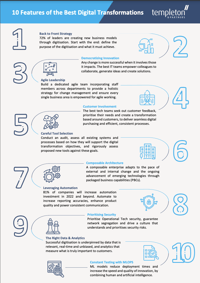Download our free infographic to find out:
- Transformation secrets from growing global businesses
- Which systems and processes increase the chance of success
- Strategies behind the most impactful digitisations.
View the infographic
What the Best Digitisation Projects Include
-
Back to Front Strategy
Deloitte reports that post-Covid, 72% of leaders are creating new business models through digital transformation. The secret to success in organisational change is starting with the end in mind: defining the exact purpose of the digitisation, what specifically it must achieve, and what this will look like. A strategic view will inform the tools, techniques, processes and people involved (rather than the other way around) meaning that every discussion and every single action taken focuses the project on achieving the success that the digitisation was initially created for.
-
Democratizing Innovation
Any major change project is significantly more successful when it involves those it impacts; in the case of digitisation, this is the entire organisation. The best IT teams empower their colleagues to collaborate, generate ideas and create solutions. Democratic transformations highlight and address potential problems as early as possible, and dramatically improve buy-in from staff across the organisation.
-
Agile Leadership & Working Practices
Success in 2022 and beyond will mean taking DevOps further and leading a truly agile, flexible and responsive approach to technology and all business activities. Companies are increasingly building dedicated agile teams incorporating staff members across departments to provide a holistic strategy for change management and ensure every single business area is capable and empowered for agile working. The most successful digitisations are founded on the goal of creating a true culture of continuous learning and optimisation, placing and keeping the company ahead of the curve and constantly innovating.

-
Customer Engagement
Zendesk reports that 75% of customers will spend more to buy from a company that offers a good customer experience. A positive digital experience in itself is more profitable and generates greater customer loyalty: Gallup found that fully engaged customers give 23% more share of wallet than the average customer.
Digitisation without a core CX focus is more than a missed opportunity: it’s moving backwards, and likely to make product quality and therefore customer satisfaction worse than before digitising. The best tech teams seek out customer feedback, prioritise their needs and create a transformation based around customers, to deliver seamless digital purchasing and efficient, consistent processes behind the scenes.
-
Careful Tool Selection
There is no one-size-fits-all for choosing your tech stack. Legacy systems are not necessarily good nor bad: keeping the wrong ones due to familiarity or cost alone can result in difficulties for integration and often outweighs the benefits of any newer and better systems later implemented. At the same time, the latest and most popular apps or systems are not necessarily the best choice for your business.
Successful IT teams conduct an audit, assess all existing systems and processes based on how they will support the digital transformation objectives, and rigorously assess proposed new tools against these goals. CIOs are increasingly leading the creation of a separate system to support all apps, databases and any new future tech that can be easily added without affecting any other element of the system.
-
Composable Architecture
A composable enterprise adapts to the pace of external and internal change and the ongoing advancement of emerging technologies through packaged business capabilities (PCBs). A modular business model means moving away from single large applications and developing mechanisms breaking down components into smaller services through leveraging APIs, software and emerging tech. Composable business infrastructure, storage and networks ensure flexibility and resilience in the face of constant change.
Gartner states the benefits as the ability to ‘move from rigid, traditional planning to active agility. Composable enterprise thinking creates more innovation, reduced costs, and better partnerships.’

-
Leveraging Automation
- McKinsey reports that 57% of all digitising companies are piloting process automation in at least one process
- Salesforce finds that 81% of companies will increase automation investment in 2022 and beyond
- 1 in 3 IT decision makers name automation as key to successful digitisation
Automating achieves more than just saving time. Automation increases information and reporting accuracies, enhances product and service quality, powers consistent communication and redirects focus into strategic and creative activities that pursue real innovation and improve the customer experience.
-
Prioritising Security
New research from Gartner warns that hackers will use digital infrastructure to commit serious harm against humans and even conduct lethal cyberattacks by 2025. The digital transformation projects with the best customer satisfaction rates and best business continuity will prioritise the security of Operational Technology (OT). Cyber security will increasingly revolve around real-life impact to customers, employees and all users and stakeholders, in addition to data protection, storage and information backups.
CTOs must guarantee network segregation in the event of attacks, and drive a culture that understands security risks and prioritises more robust working practices to ensure every aspect of the business is as secure as possible.
-
The Right Data & Analytics
Forbes reports that 52% of executives believe bespoke, sophisticated data analytics ‘enables us to deliver a superior customer experience’. Poor quality data will result in poor quality decision-making, unfocused R&D, products and services with features irrelevant to the customer, and therefore reduced customer satisfaction and revenue. Successful digitisation projects are underpinned by data that is relevant, real-time and unbiased, and analytics that measure what is truly important to customers and their real behaviours, pain points and needs.

-
Constant Testing & Development with MLOps
The best digitisations – and the best company innovation overall – of the next five years will be driven by MLOps. DevOps teams are increasingly using Machine Learning (ML) models to reduce deployment times by effectively managing the ML lifecycle and creating reproducible workflows that facilitate constant testing and development with immediate and long-term results. Tech teams are dramatically increasing the speed and quality of innovation, and therefore informing digital transformation programmes and subsequent technological enhancements across the business, through combining human and artificial intelligence.
Find The Specialist IT Team to Power Your Digital Transformation
Looking to hire Developers, Programmers, Engineers or IT leaders? Templeton’s award-winning tech recruitment services span 40 countries all over the world.
Explore the Top 5 Tech Tools that Drive Successful Digitisation Projects.
Sources:
Deloitte
Forbes
Gallup
Gartner
McKinsey
MuleSoft
Salesforce
ZDNet
Zendesk





